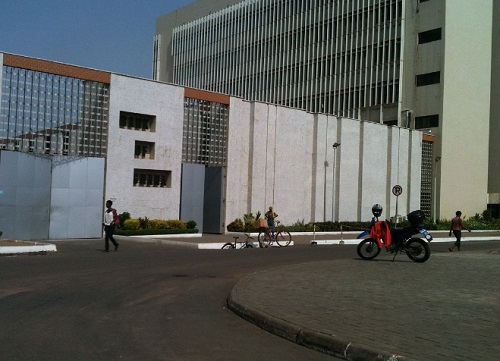The Acting Director General of the Geological Survey Authority (GSSA), Issac Mwinbelle, has offered insights into the rationale behind the Bank of Ghana's (BoG) decision to relocate its head office to a safer area.
Mr. Mwinbelle highlighted that the Ridge location chosen for the new headquarters is less vulnerable to earthquakes and tremors compared to the current High Street site, near James Town in Accra.
Related Articles
Mahama accuses BoG governor of concealing mismanagement through Debt Exchange
Why BoG is constructing new Head Office building as most important priority project
In an interview with the Ghana Broadcasting Corporation (GBC) on their GBC Radio network, Mr. Mwinbelle explained that the current location was susceptible to tremors and earthquakes due to the presence of fault lines in the area.
He emphasized that the coastal parts of Ghana, especially the eastern region of Accra, were prone to seismic activities, with fault lines running through Krokrobite, Weija, and Dansoman.
Mwinbelle acknowledged that while the current fault zones had not produced significant tremors, the movement along the fault lines had potential consequences.
He commended the Bank of Ghana's proactive approach in assessing the safety of its location, aiming to ensure the security of its staff and facilities.
He compared the safety of the new Ridge location to the High Street area, stating that the distance from the coastline played a role in mitigating earthquake-related risks.
“Generally, the coastal parts of Ghana, most specifically the eastern part of Accra, are earthquake-prone and these earthquakes occur as a result of the fault line," he said.
“The coastal part of Ghana has a number of fault lines that pass through the area, but the prominent ones, which has for the period produced some substantial earth tremors and earthquakes are the fault lines that are within the Krokrobite, Weija, and the Dansoman area.
“Most of the earthquakes that have occurred over the period are a result of the movement along the fault line. The latest one which was on the 10th of March this year, if you look at the epicentre, it was close to James Town, meaning that it is moving towards the current location of the Bank of Ghana.
“There are fault zones in these areas, but they have not produced any substantial earth tremor. It doesn’t mean that there cannot be an earth tremor along those fault lines and for that, if the Bank of Ghana is being proactive by doing an assessment to find out whether the current location is suitable for a central bank or not, I think it is a plus for them, because they must ensure the safety of the Bank, the safety of the staff as well as the safety of whatever is contained there.
”If you look at the earthquakes that have occurred, they have always occurred off the coastline that is into the sea, and by approximation Ridge is much further away from the coastline which is more offshore than the current location [of the Bank of Ghana] which is the High Street area.
“In terms of lateral placement, the Ridge location might be much safer when it comes to earth tremors because the closer the structure is to the epic centre, the more devastation that it would cause as compared to when it is further away from the epicentre. We may likely experience much lower devastation on the structure.”
The Bank of Ghana had earlier released a statement explaining its decision to relocate its headquarters. The statement outlined that a structural integrity assessment revealed the current building's inadequacy to withstand significant earth tremors and other potential challenges. The bank emphasized its commitment to enhancing operational efficiency and positioning itself as a financial hub in the sub-region, which led to the priority project of a new head office.
The decision faced scrutiny, with the Minority Leader, Dr. Cassiel Ato Forson, raising concerns over the cost and financial implications of the new headquarters. He alleged that the bank was spending a substantial amount at a time when financial difficulties were evident. The minority also questioned the source of funding for the new building.

